Roadblock (1951)
D: Harold Daniels. Charles McGraw, Joan Dixon, Lowell Gilmore, Louis Jean Heydt, Milburn Stone. Insurance investigator's growing attachment to a money-hungry woman leads him to crime. Typical film noir formula, smoothly executed.
Meredy's Thoughts:
This is a low-budget but highly engrossing film noir. In noir fashion sex and money leads to Joe Peters' (Charles McGraw's) destruction in the film. According to film critics Robert Porfiero and Alain Silver, the screenwriters take a hard-boiled mystery plot and combine it with "an aura of middle-class malaise and pervasive corruption to provide a motivation for Peters' alienation and fall." And, the noir notion of entrapment is illustrated by the staging of Peters' death in the semi-dry Los Angeles river bed, in one of the first car chases to be filmed there. I'm going to watch this one.
Strip, The (1951)
D: László Kardos. Mickey Rooney, Sally Forrest, William Demarest, James Craig. Rooney gives sincere, energetic performance as former drummer involved with gangsters, trying to help Forrest get a movie break. Routine film enlivened by great music of Louis Armstrong, Earl Hines, Jack Teagarden and all-star group.
Meredy's Thoughts:
Much of the picture was shot on location in and around the Sunset Strip. Interiors were shot at popular nightclubs Mocambo and Ciro's and at restaurants Little Hungary and Stripps. Pete Rugolo, who is credited with Leo Arnaud with the film's orchestrations, was a well-known jazz arranger. The film effectively captures the existential mood and the glee derived from the club scene on the Strip. The song "A Kiss to Build a Dream On" was nominated for an Academy Award for Best Song. Definitely worth a look for the music alone.
Beware, My Lovely (1952)
D: Harry Horner. Ida Lupino, Robert Ryan, Taylor Holmes, Whitehead, Barbara Whiting. Brooding, atmospheric psychological thriller with kindly World War I widow Lupino hiring wanderer Ryan as a handyman and discovering he's a psychopath.
Meredy's Thoughts:
This film is based on the 1950 Broadway play The Man by Mel Dinelli who also wrote the screenplay. Dorothy Gish and Don Hanmer played the leads on Broadway. The story was also featured on the CBS radio show Suspense as "To Find Help" on January 18, 1945 with Frank Sinatra as Howard and Agnes Moorehead as Mrs. Gillis (Mrs. Gordon in the film). It was dramatized again on Suspense on January 6, 1949 with Gene Kelly and Ethel Barrymore.
The movie was shot over an 18 day period in 1951 for Collier Young and Ida Lupino's production company, The Filmakers. Howard Hughes, then the head of RKO, withheld the film from release for a year. Co-star Robert Ryan later said that he felt Hughes tried to bury the film because Ryan was active in left-wing politics and spoke publicly about his involvement.
If Robert Ryan and Ida Lupino are in a film together, I'm watching it.
Leonard Maltin Review ***:
D: Fritz Lang. Barbara Stanwyck, Paul Douglas, Robert Ryan, Marilyn Monroe, Keith Andes, J. Carrol Naish. Moody, well-acted Clifford Odets story of drifter Stanwyck settling down, marrying good-natured fisherman Douglas. Cynical friend Ryan senses that she's not happy, tries to take advantage. Andes and Monroe provide secondary love interest.
Meredy's Thoughts:
Odets' Clash by Night was originally performed in 1941 as a neo-realist Broadway play with Tallulah Bankhead in the Stanwyck role. Fritz Lang changed the locale from Staten Island to a fishing town in California, but he kept intact the oppressive seacoast atmosphere.
The drama is structured into two almost equal parts and each is almost a complete drama in its own. The two parts are separated by a year in time. Each section begins with a non-fiction, documentary look at the fishing industry in Monterey, California. It then moves on to the story. Arguably, the motion picture is two films: each of around an hour's length and strung together as a serial.
The title of the film comes from Matthew Arnold's poem "Dover Beach" (1851). Specifically: It is a place "where ignorant armies clash by night."
The film features taut direction by Fritz Lang and a sizzling performance by Barbara Stanwyck. Example of her biting, caustic dialogue delivered with perfection. "What do you want, Joe, my life's history," she snaps. "Here it is in four words: big ideas, small results." Paul Douglas and Robert Ryan are fine. Marilyn Monroe is a pleasant, lighthearted addition in a supporting role.
Stanwyck, Ryan, Douglas and Monroe directed by Fritz Lang makes this film a must-see.
Kansas City Confidential (1952)
D: Phil Karlson. John Payne, Coleen Gray, Preston Foster, Neville Brand, Lee Van Cleef, Jack Elam, Dona Drake. Tough action drama with hard-luck ex-con Payne implicated in a bank heist, determined to quite literally unmask the real culprits. Quentin Tarantino must have seen this one prior to scripting Reservoir Dogs!
Meredy's Thoughts:
Phil Karlson’s filmmaking has few of the standard noir flourishes: the dark and brooding shadows, the bizarrely canted camera angles. Instead he works through gigantic close-ups and an unusually visceral treatment of bare-knuckle violence.
The cast is a good one. John Payne and Coleen Gray are particularly strong.
Though produced under the Hays Code censorship regulations, Kansas City Confidential constituted one of the most brutal and violent crime pictures made up through that time; as such, it retains historical significance. It also claims a strong cult following.
Add K.C.C. to your film noir queue. It has the best collection of baddies: Neville Brand, Lee Van Cleef and Jack Elam. In addition, Preston Foster isn't playing Roddy McDowall's daddy in this one.
Macao (1952)
D: Josef von Sternberg and Nicholas Ray. Robert Mitchum, Jane Russell, William Bendix, Gloria Grahame, Thomas Gomez, Brad Dexter, Philip Ahn. Flat yarn supposedly set in murky title port, with Russell a singer and Mitchum the action-seeking man she loves.
Meredy's Thoughts:
Producer Howard Hughes fired director von Sternberg during filming and hired Nicholas Ray to finish it. When many of Von Sternberg's scenes made no sense dramatically, Ray asked Robert Mitchum to write several bridging scenes. Filming was completed in 1950 but the film wasn't released until 1952.
Bruce Eder: "Jane Russell gives a sharp, naturalistic and purely sensual acting performance. She commands every scene in which she appears. Brad Dexter makes an excellent villain, like a more pathological version of Steve Cochran. Meanwhile, Robert Mitchum, in his portrayal of a neurotic, perhaps shell-shocked veteran, shows a vulnerable side that seldom came out so convincingly or touchingly in his RKO movies."
If you're looking for an underrated film noir gem, this is it!
Talk About a Stranger (1952)
D: David Bradley. George Murphy, Nancy Davis (Reagan), Billy Gray, Kurt Kasznar, Lewis Stone. A lonely boy tries to prove reclusive neighbor Kasznar killed his dog. Good use of California orchard locations, well-judged direction, and John Alton's moody photography result in a fine little B that deserves to be better known.
Meredy's Thoughts:
Based on Charlotte Armstrong's short story "The Enemy" with a screenplay by Margaret Fitts.
Bobby Fontaine (Billy Gray of Father Knows Best) is sure something malevolent is happening beneath the quiet surface of his small town. A good study in paranoia. Features wonderfully sinister cinematography by John Alton.
Split Second (1953)
D: Dick Powell. Stephen McNally, Alexis Smith, Jan Sterling, Keith Andes, Arthur Hunnicutt, Paul Kelly, Robert Paige, Richard Egan. Capable cast in odd suspenser about escaped convict (McNally) holding several people hostage in Nevada ghost town-- though well aware it's a nuclear test site! Script by William Bowers and Irving Wallace. Powell's directorial debut.
Meredy's Thoughts:
Dick Powell made an impressive directorial debut with this taut atomic-age noir. Novelist Irving Wallace collaborated on the script of Split Second with Chester Erskine and William Bowers. Features the top-notch black-and-white cinematography of Nick Musuraca. The cast does not disappoint. Alexis Smith is especially nasty. The ending is very memorable.
Not as well known as it should be. Give it a chance. My favorite noir dialogue: Larry Fleming (Keith Andes): You don't think very much of people, do you? Sam Hurley (Stephen McNally): I don't think very much of anything.
Narrow Margin, The (1952)
D: Richard Fleischer. Charles McGraw, Marie Windsor, Jacqueline White, Queenie Leonard. Hard-boiled cop, transporting a gangster's widow against his will to the trial in which she'll testify, must dodge hit men aboard their train who are trying to silence her. One of the best B's ever made--fast paced, well acted, impressively shot in claustrophobic setting. Photographed by George E. Diskant; scripted by Earl Fenton, from a story by Martin Goldsmith and Jack Leonard. Remade in 1990. Also shown in computer-colored version.
Meredy's Thoughts:
Originally titled The Target, RKO's noir programmer The Narrow Margin is a hard-boiled masterpiece of gangland-flavored tough-guy dialogue and of economy in setting and pace. The screenplay by Earl Felton was nominated for an Academy Award.
Director Richard Fleischer, the son of famed cartoonist Max Fleischer, reached the high point of his low budget career with this film.
The Narrow Margin is considered by critics and film historians to be a classic example of film noir. Reflects the "noir view" of an unstable and deceiving moral reality. A must-see!
His Kind of Woman (1951)
D: John Farrow and Richard Fleischer. Robert Mitchum, Jane Russell, Vincent Price, Tim Holt, Raymond Burr, Charles McGraw, Marjorie Reynolds, Jim Backus. Mitchum blindly goes to Mexico for a payoff of 50 grand, discovers he's the soon-to-be-dead chump whose identity will help deported gangster Burr re-enter the country. Cult film is overlong, but its spoofing of he-man heroics predates the more celebrated Beat the Devil by three years; Price is hilarious as a ham actor.
Meredy's Thoughts:
The movie was directed officially by John Farrow and based on the unpublished story Star Sapphie by Gerald Drayson. Howard Hughes was dissatisfied with John Farrow's work, and a number of scenes were cut, added, and re-shot by the uncredited Richard Fleischer.
Robert Mitchum is in his element as the loner anti-hero and Jane Russell is more than decent.
Technically, this film is a film noir crossed with a somewhat satirical comedy. The final third of the film is bizarre. Vincent Price's wild comic take is contrasted with a sadistic torture sequence involving Robert Mitchum.
It's a weird and wacky flick. Would make a good film for #TCMParty.
Locket, The (1946)
D: John Brahm. Laraine Day, Brian Aherne, Robert Mitchum, Gene Raymond, Sharyn Moffet, Ricardo Cortez. Another of those post-WW2 psychological dramas, with Day as a woman who makes men fall in love with her--blinding them to her true personality (and problems). Famed for its flashback within a flashback within a flashback . . . but not very good. Look for young brunette Martha Hyer as a party guest and Ellen Corby as a household servant.
Meredy's Thoughts:
The film is based on a screenplay by Sheridan Gibney, adapted from "What Nancy Wanted" by Norma Barzman, wife of later-blacklisted writer Ben Barzman. Hume Cronyn originally bought the Norma Barzman screenplay to produce and direct the film with his wife Jessica Tandy in the lead role, but later sold the rights to RKO Pictures, which then assigned Gibney to rewrite the screenplay. The original Barzman screenplay is in the Cronyn-Tandy papers at the Library of Congress.
Wheeler Winston Dixon: "Director John Brahm keeps a firm hand on the proceedings, and effectively stages The Locket so that most of it happens at night, on claustrophobic studio sets. Mitchum, a rising star at the time, is oddly convincing as Norman Clyde, a Bohemian artist with attitude to spare, and Nicholas Musuraca’s moody lighting leaves the characters, and the viewer, in a state of continual confusion and suspense. Most intriguing, of course, is the triple-flashback structure of the film, which brings into question the reliability of the film’s narrative. When Dr. Blair bursts in on John Willis and begins his recital of Nancy’s crimes, Blair’s flashback contains Norman Clyde’s reminiscences, which in turn contain Nancy’s own memories of her childhood, as told to Norman, containing the incident of the locket."
A bit convoluted but intriguing. Getting the chance to watch Robert Mitchum effectively play a pussy-whipped artist is one reason to see this one.
Angel Face (1953)
D: Otto Preminger. Robert Mitchum, Jean Simmons, Herbert Marshall, Mona Freeman, Leon Ames, Barbara O'Neil, Jim Backus. Ambulance driver Mitchum has the misfortune to meet, and become involved with, scheming young Simmons.
Meredy's Thoughts:
Angel Face is an intense Freudian melodrama by Otto Preminger. It's one of the forgotten masterworks of film noir. Jean Simmons and Robert Mitchum are terrific in their roles.
Film critic Paul Brenner wrote, "Preminger transforms a second rate James M. Cain murder plot, re-orchestrating this textbook tale of passion and murder into a haunting and haunted refrain. The by then clichéd story line is pared away and brought down to an elemental level -- there is not a wasted scene in the film — and the story's familiarity breeds an aftertaste of inevitability and doom. The hallucinogenic nature of the proceedings is accented with Preminger's direction and camerawork, having actors drift from foreground to background or having the camera track to fluid and suffocating close-ups. Preminger, ever the mesmerizer, weaves his style into a half-dreamt haze of nightmare."
This film is an atypical film noir that has developed a considerable cult reputation over the years. The cool, detached qualities that make Angel Face special will alienate many, but those who tune into it will be rewarded.
Elevator to the Gallows (1958)
D: Louis Malle. Jeanne Moreau, Maurice Ronet, Georges Poujouly, Yori Bertin, Jean Wall. A man and woman plan to murder her husband, but fall short of committing a "perfect crime.'' Intriguing, but doesn't hold up. This was Malle's first non-documentary feature as director. Music score improvised by Miles Davis. Also known as Lift to the Scaffold.
Meredy's Thoughts:
Ascenseur pour l'échafaud is a French crime film directed by Louis Malle. It was released as Elevator to the Gallows in the United States and as Lift to the Scaffold in the United Kingdom.
Tried to watch this one on Hulu Plus. Not my cup of tea.
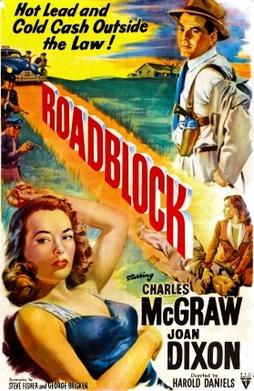
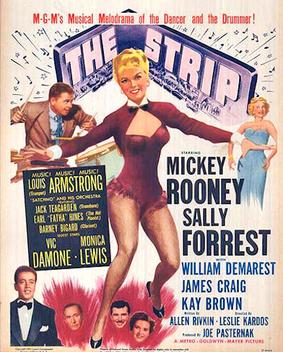
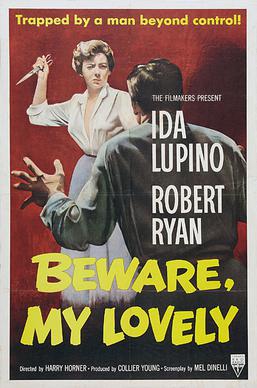
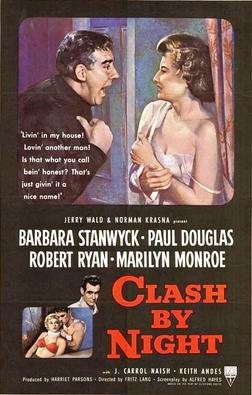
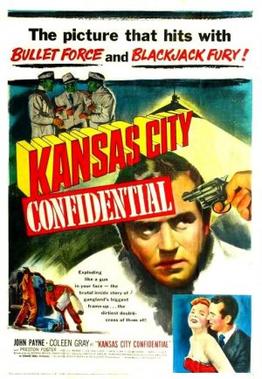
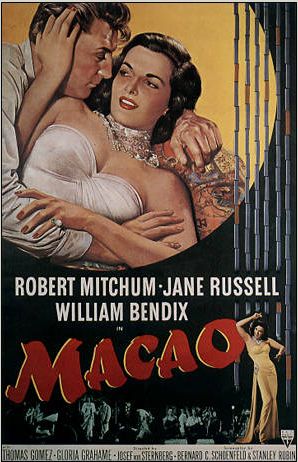



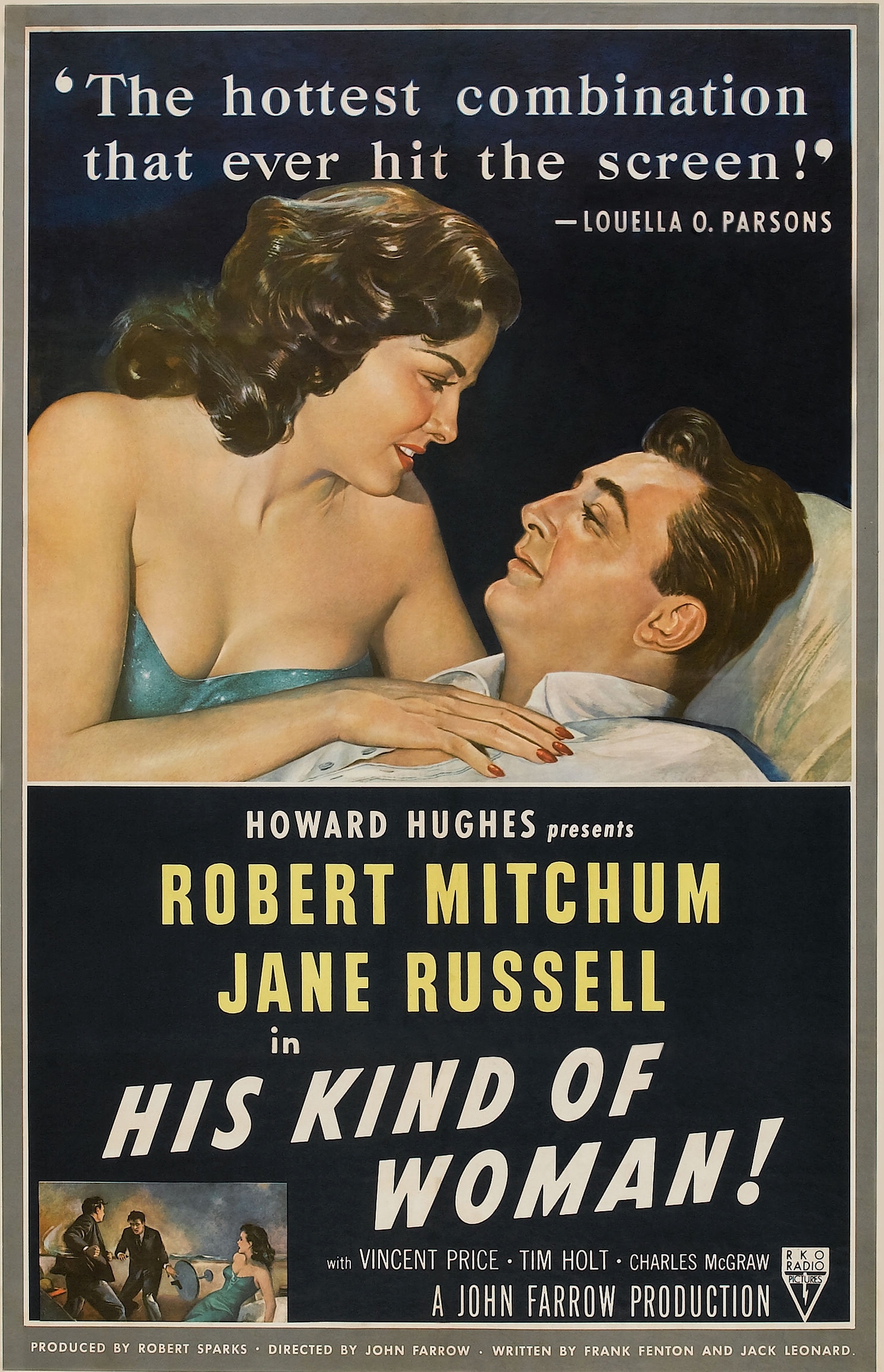

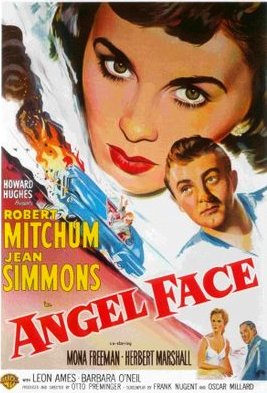
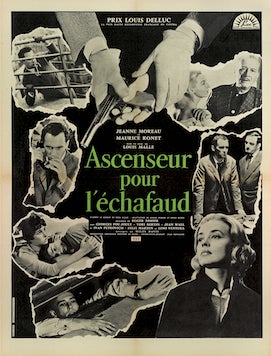
No comments:
Post a Comment